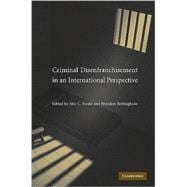
Note: Supplemental materials are not guaranteed with Rental or Used book purchases.
Purchase Benefits
What is included with this book?
| Contributors | p. vii |
| Foreword: Waves of Democracy and Criminal Disenfranchisement | p. xi |
| Acknowledgments | p. xv |
| Introduction | p. 1 |
| Contemporary Disenfranchisement Law | |
| Voting Rights and Human Rights: A Comparative Analysis of Criminal Disenfranchisement Laws | p. 25 |
| Punishment and Social Exclusion: National Differences in Prisoner Disenfranchisement | p. 59 |
| Disenfranchisement in Comparative Perspective: Legal and Political Approaches | |
| U.S. Felon Disenfranchisement: Parting Ways with Western Europe | p. 79 |
| The Right to Universal, Equal, and Nondiscriminatory Suffrage as a Norm of Customary International Law: Protecting the Prisoner's Right to Vote | p. 109 |
| Our 'Crooked Timber': Why Is American Punishment So Harsh? | p. 136 |
| Voting Rights and People with Criminal Convictions: Case Studies | |
| The Politics and Legality of Prisoner Disenfranchisement in Australian Federal Elections | p. 167 |
| The Campaign for Prisoner Voting Rights in Ireland | p. 205 |
| The Ballot as a Bulwark: Prisoners' Right to Vote in South Africa | p. 221 |
| The Right to Vote in Danish Prisons | p. 244 |
| In Defense of Prisoner Disenfranchisement | p. 259 |
| Index | p. 281 |
| Table of Contents provided by Ingram. All Rights Reserved. |
The New copy of this book will include any supplemental materials advertised. Please check the title of the book to determine if it should include any access cards, study guides, lab manuals, CDs, etc.
The Used, Rental and eBook copies of this book are not guaranteed to include any supplemental materials. Typically, only the book itself is included. This is true even if the title states it includes any access cards, study guides, lab manuals, CDs, etc.